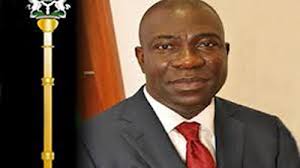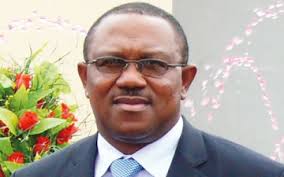Deputy Senate President, Senator Ike Ekweremadu, has given an indication that the National Assembly will go ahead with the constitutional amendment despite the court action by the Presidency.
Ekweremadu said Monday that no amount of propaganda from any quarter would deter the Assembly from going ahead with the amendment.
He also said that the NASS had not been served with any court process stopping the amendment.
President Goodluck Jonathan recently returned the the constitution amendment bill passed by the National Assembly that was sent to it for his assent. He had pinpointed some provisions in the amendment which were tantamount to constitutional breaches and usurpation of executive powers by the legislature.
The presidency proceeded to the Supreme Court to seek an order to stop the National Assembly from going ahead with the constitution amendment or overriding him by vetoing the bill.
Ekwerremadu, at the induction certificate course on legislative studies for new legislators, said the the National Assembly read on the papers the suit filed by the presidency stopping the constitution amendment.
He said, ” As I speak to you, there is no court process that has been served on National Assembly. So, as far as I am concerned, there is nothing in court.
“We also read in the papers that Bayo Ojo wrote a letter on behalf of the government, asking us not to deliberate on the matter pending the matter in court. I want to also say that no letter was received from Bayo Ojo or anybody whatsoever. It’s just shear media propaganda. But I want to assure Nigerians that we will resist it.”
On the leadership of the National Assembly, he said, “I am here to speak on the leadership at the National Assembly. I believe everybody should be interested in it because we are potential leaders at the NASS.
“The concept of leadership is the same everywhere and it is about positive influence, transformation and goal actualisation.
In the past some Nigerians tried to impose principal officers on the National Assembly, we recall that when Ghali Na’abba was having issues in the House, they were able to resolve it because there was no external influence.
“But we had a running battle with the executive when Patricia Etteh was speaker because of the support of the executive and we saw what happened. So it is advisable to allow the legislators to elect their principal officers without interference.
In the National Assembly, we have laid down provisions for principal officers and one is the issue of ranking. As a new legislator you have to accept this provision, that ranking officers are elected because tomorrow you may be a beneficiary, so it good for this provision to be sacrosanct.
“Parliament is as good as the leadership and it is an indicator of the stability of that institution determines the stability of govt and this is because if the leadership of the National Assembly is having any problems, it will affect the country as a whole.”
Senator Ekweremadu was the Chairman, Constitution Review Committee.
The Senate President, Senator David Mark noted, in his remarks, said that the National Assembly had in the previous dispensation conducted the induction of new members in the six get-political zones but was constrained by finances to hold it one central location.
” As you may be aware, the format of the induction for the 8th National Assembly is slightly different from previous ones. On this occasion, we have brought our Distinguished Senators-erect and Honourable members-erect together in order to encourage wider interaction amongst all parliamentarians,” he said.
“This is different from the previous model when NILS (National Institute for Legislative Studies) would conduct the induction in the six geo-political zones. This new model also makes more economic sense in the wake of the dwindling revenue brought about by the fall in oil prices.”
Mark decried the high turnover rate in the NASS, which he said did not augur well for experience of law makers.
he said, “On average, since 2003, we have witnessed a high turnover rate of National Assembly members. The Average return rate of National Assembly members is in the region of 30 per cent.
” I have stressed this point because from my experience you will find that this will impact on our discussion, deliberations and debate over the next four years.”
On the induction of newly elected Senators and members of the House of Representatives, he said, “It is very important. First of all people will get acquainted and the interaction between the legislators is very important as a foundation to running a very stable National Assembly.
“But more importantly of course is that they will learn the procedures and the various things that happen within the National Assembly.
“Obviously, when people are new to a system, it takes time for them to adjust, learn the procedure and even find their way round the National Assembly building. So it will be a very slow start obviously.
“If the members returning are more, things will start a lot quicker but it will be slow because it will be a learning process for about 70 per cent of the members are new.
The Senate President also commented on the number Bills assented to by the President, adding, “President will sign the bills that he wants to sign, the ones he doesn’t want to assent to, he will return to us and we will do the needful.
“The President has taken a Bill to the court. It is a Bill at the moment, unless it is signed, I really don’t see why they are in court but anybody can go to court, so I can’t stop you.”














